This story originally appeared in i-D’s The Royalty Issue, no. 370, Winter 2022. Order your copy here.
Dropping at midnight to a wave of surprise across the Internet, Stormzy’s September 2022 comeback single, Mel Made Me Do It, was an eleven-minute-long opus that defiantly announced the return of Stormzy, the UK’s most inventive MC, to the scene he has been the king of since 2016.
His first solo outing in nearly three years, it crammed an impressive list of shoutouts, disses, and video cameos (José Mourinho; Louis Theroux; Michaela Coel; JME) around a sparse, jangling, moody beat, in a stream of boastful, magnetic, charming rap. It showcased everything we love about Michael Omari: the humour, the energy, the talent, the ability to synthesise a boyish charm and braggadocio with an eye on society and his place in it, the culture he’s come from and how that culture has changed the mainstream.

About three-quarters of the way through, he mentioned this cover story: “I was double-spread Mike / Now I cover i-D.” This is Stormzy’s second i-D cover story, though. Back in 2016, when that first cover dropped onto the shelves of WHSmith, he hadn’t released his debut album. But even then it was clear what a special artist he was, and how much potential there was for him to grow.
Grime was just entering its second golden era and, at that moment, Stormzy was the most electric MC to bubble up through the scene. He was attuned to the history and lore of the genre – Lord Of The Mics and Bethnal Green council estates; the legacy of dancehalls, ripped CDRs, pirate radio stations, Eskibeat, Roll Deep and Boy Better Know – but he was also possessed with the talent and drive to take it to another place musically and socially, and he saw a way to do so without selling out or diluting the energy that made it so vital in the first place.
Subscribe to i-D NEWSFLASH. A weekly newsletter delivered to your inbox on Fridays.
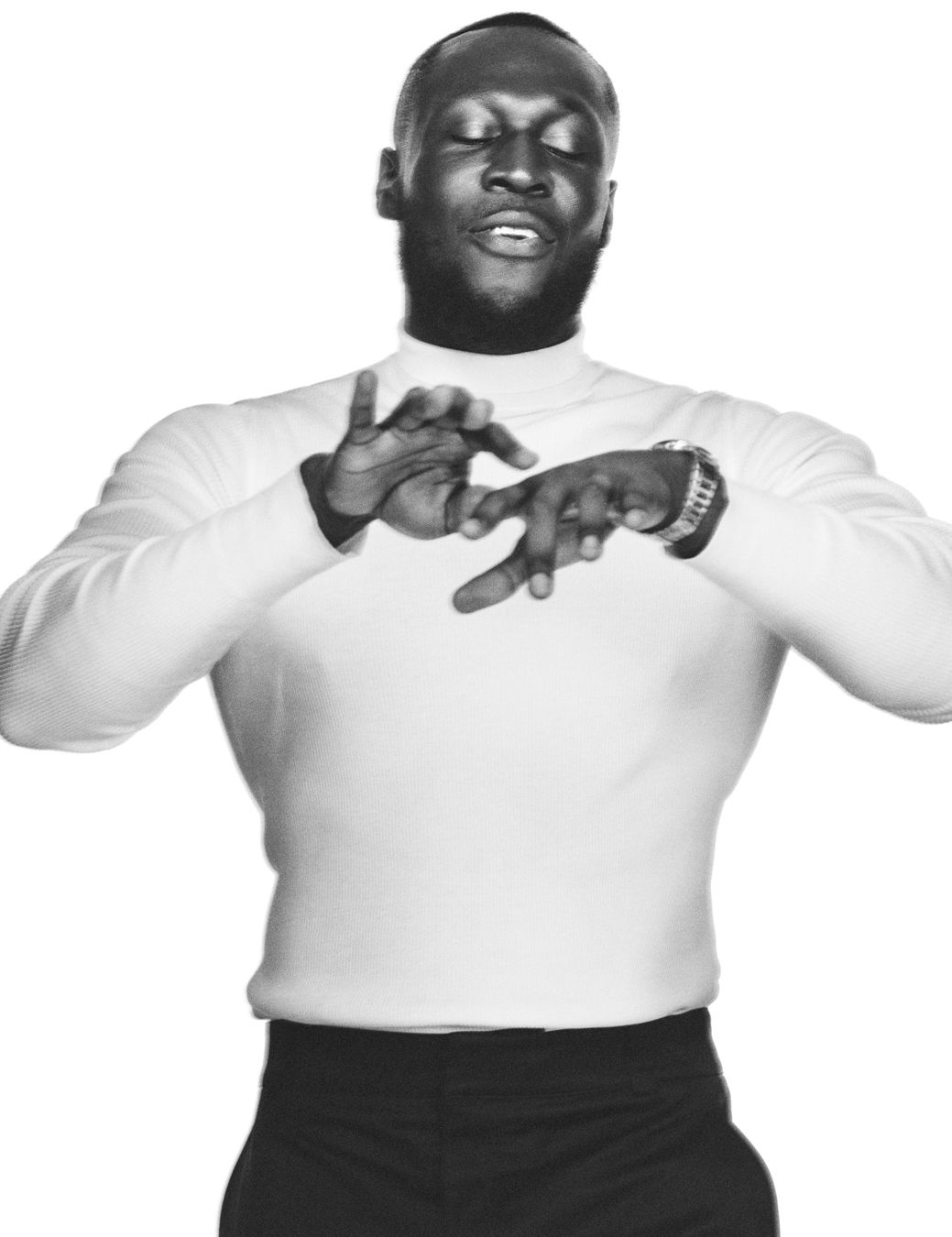
This is exactly what he’s done in the intervening years. He followed through on the promise of grime as a cultural revolution. In the six years between his two cover stories he has: headlined Glastonbury, spoken at the University of Oxford, launched a publishing imprint for underrepresented voices with Penguin, supported scholarships for Black students going to Cambridge, tried to hold the government to account over Grenfell, headlined Reading and Leeds and festivals, had two Mercury Prize nominations, and been named the third most influential Black person in the UK on the 2021 Powerlist. He’s had four UK number one singles, two number one albums, and earned three Brit awards. He now sits on the throne as the most well-known, respected, and loved figure in the scene.
It’s obviously impressive – but, in recent years, he’s been somewhat quiet. After cancelling a world tour in 2020 because of the pandemic, he deleted his social media accounts and retreated to the studio to work on his third album. He’s occasionally dipped his head above water, like featuring on songs with his friend Dave, but “Mel Made Me Do” It was a triumphant homecoming, worth the wait and the period of gestation, a reminder of the force of his talent to a UK music scene that, in the intervening years, has moved away from grime and seen the astronomical rise of drill, afrobeats, and UK rap.
“I’ll never be able to sing like Whitney but I can sing in my own way; I can sing with my honesty and my truth.” Stormzy
“To make a classic, yeah, it takes ages,” he raps on “Mel Made Me Do It” – and the same sentiment is true for This Is What I Mean, an album which has been three years in the making, and is set to be no less of an instant classic although the powerful swagger of the single is notably absent for much of it.
Instead, This Is What I Mean is softer and soulful. It is an album full of feeling, rawness and emotion. It’s an album about God and love, about coming to terms with the end of a famous and well-publicised relationship; about working through those feelings, examining your faults, looking deep inside yourself, and working out who you want to be as a man.
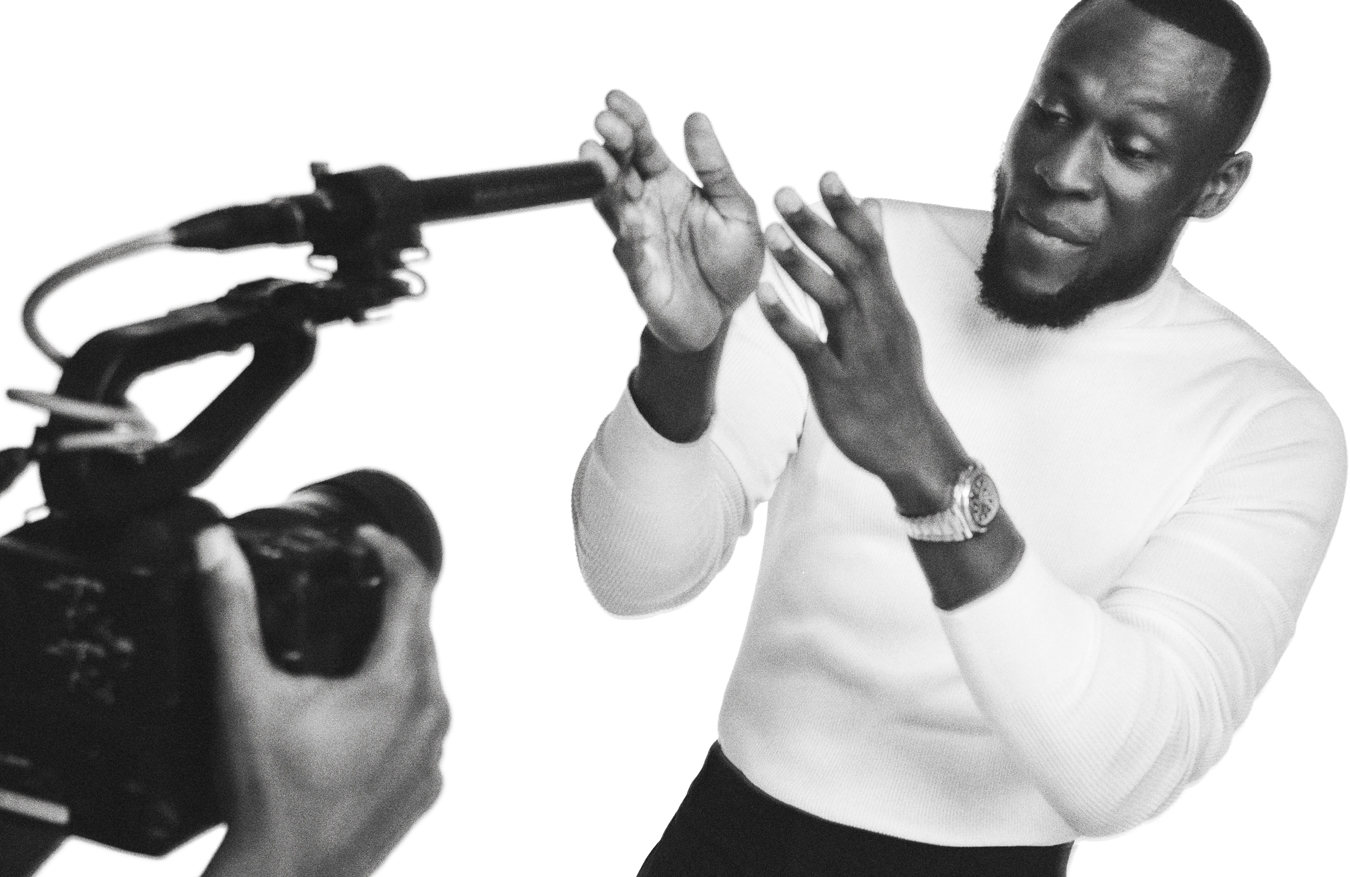
It’s a brave album, too. Not just in its emotional honesty, but creatively as well. Stormzy spends much of it singing over melancholic, hymnal pianos, duetting with choirs, and giving space over entirely to guest stars like Sampha or the newly discovered talent, Debbie. It’s not a grime album, but an album by an artist entering a new phase in their career.
In the years of its creation he has also signed to Def Jam 0207, a UK-based imprint of the renowned label, with his long-time collaborators, Alec and Alex Boateng. To celebrate that and the new album, we united Stormzy with the founder of the original Def Jam, Rick Rubin, to sit down and listen to the album…
“I’ve held myself accountable. I’ve looked in the mirror. I’ve deeped every detail of my life. And then I was just like, give it to God. Free yourself.” Stormzy
Rick: Yo! How are you feeling man?
Stormzy: I’m feeling good! It’s an honour to talk to you. It’s a real pleasure. God bless.
Rick: How’s it going?
Stormzy: I’m trying to keep it cool, man, to be honest. It’s an honour.
Rick: Do you want to take a breath together? Let’s take three deep breaths together. Let’s share the air. Let’s take a moment to be together…
Stormzy: [Breathes in harmony with Rick] Amazing. That helps.
Rick: It does, doesn’t it? Alright. So when we last spoke you were just starting work on the album. I don’t know if you had any music at all yet.
Stormzy: There was nothing.
Rick: But you were ready to dive in.
Stormzy: Exactly. We spoke the day before the first recording session. It was crazy because, when we spoke then, you reiterated something that I knew but hadn’t quite come to terms with yet. When you are making something, you have to consider the audience last. I knew in my heart what I had to do, but hearing you tell me that made me even surer of myself.
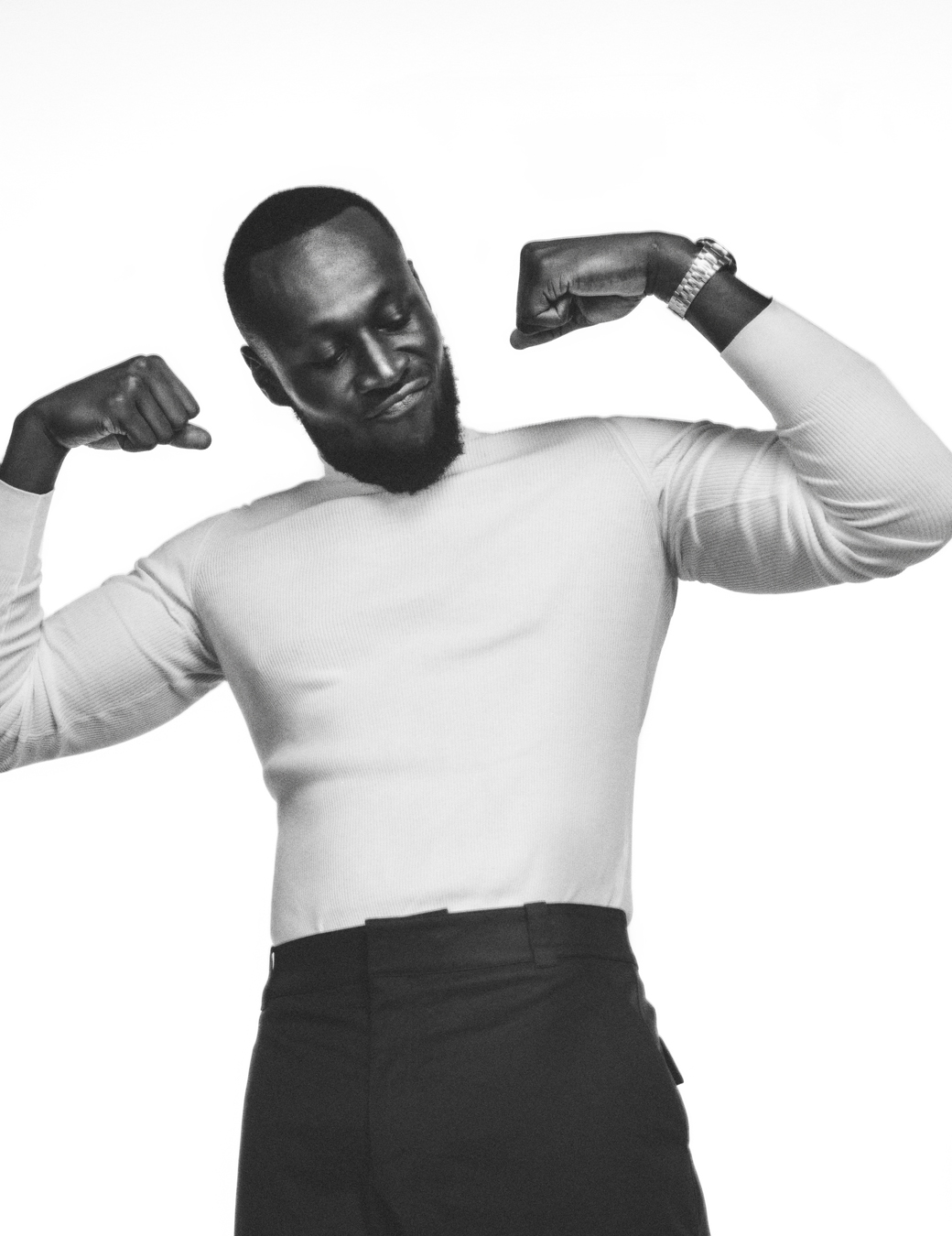
Rick: It’s funny to say it but it’s true, and it is in service to the audience that you can’t think about them.
Stormzy: It’s a funny thing. I talk about it a lot with The Twins, Alec and Alex. Real artistic freedom is about not considering the audience, but you have to do that in a really pure way. It’s not about defying what everyone thinks about you; it’s about being totally true to yourself.
Rick: Exactly. It’s about making your art true to yourself: if you try to second guess yourself to please someone else, then that’s never real. The best thing you can do is to create something that you love, whether people like it or not. That’s real. That’s who you are. And it is that which should dictate who your audience is, because the only sustainable thing is to make the music you want to make.
Stormzy: I find it impossible to figure out what people want from me. This idea of being in the studio, thinking you have to make a certain kind of song… it’s the least creative place you can be. And really, the audience doesn’t even know what they like – and I know that because I’m the same when I’m listening to music. Think about how often you hear something and you connect with it when you might never have expected it to? So the process of making this album has been very selfish. We had this essence and culture that we tried to keep in mind with every decision we made while making the album. We covered a whiteboard in the studio with quotes that we found inspiring. One quote you used at the beginning of your book – and I’m going to misquote it, so forgive me, but it’s about creating a space for yourself that allows art to be inevitable. So we were super pure in every decision that we made while making the record. But you know how it is when you’re finishing a record – there’s a functionality to that bit of the process. The first song on the album is called “Fire + Water” and, when we got to the point of finishing the album, the song was eight minutes long, and we were second-guessing the length of it. We kept on asking whether it worked, or if people would like it. So we had to strip all this external noise away and ask ourselves properly how the eight minutes of this song made us feel. Did it make us feel good? Did we want that guitar part to keep going? Did we want those drums to keep drumming? It was selfish, but in a beautiful way. One thing I tried to keep in mind when making the album was that I needed to love it. I need to love the music I make more than anyone else. It should be my pride and my joy.
Rick: It’s the job of the artist to say, “This is me and this is my work”. Hopefully the audience likes it, but either way it has to be mine, because if it is not mine then what is it?
Stormzy: I do not take making music for granted at all. Every time I walk into the studio I just hope that something comes out. I hope to God that it comes. And that’s one thing I have understood while making this record. We went into the studio. We prayed. We ask God to guide us. And then whatever comes out comes out… It takes the pressure off.
Rick: You become the vehicle that allows something to happen. Let’s listen to the album.
[Stormzy reaches for the aux cord and plugs his phone in]
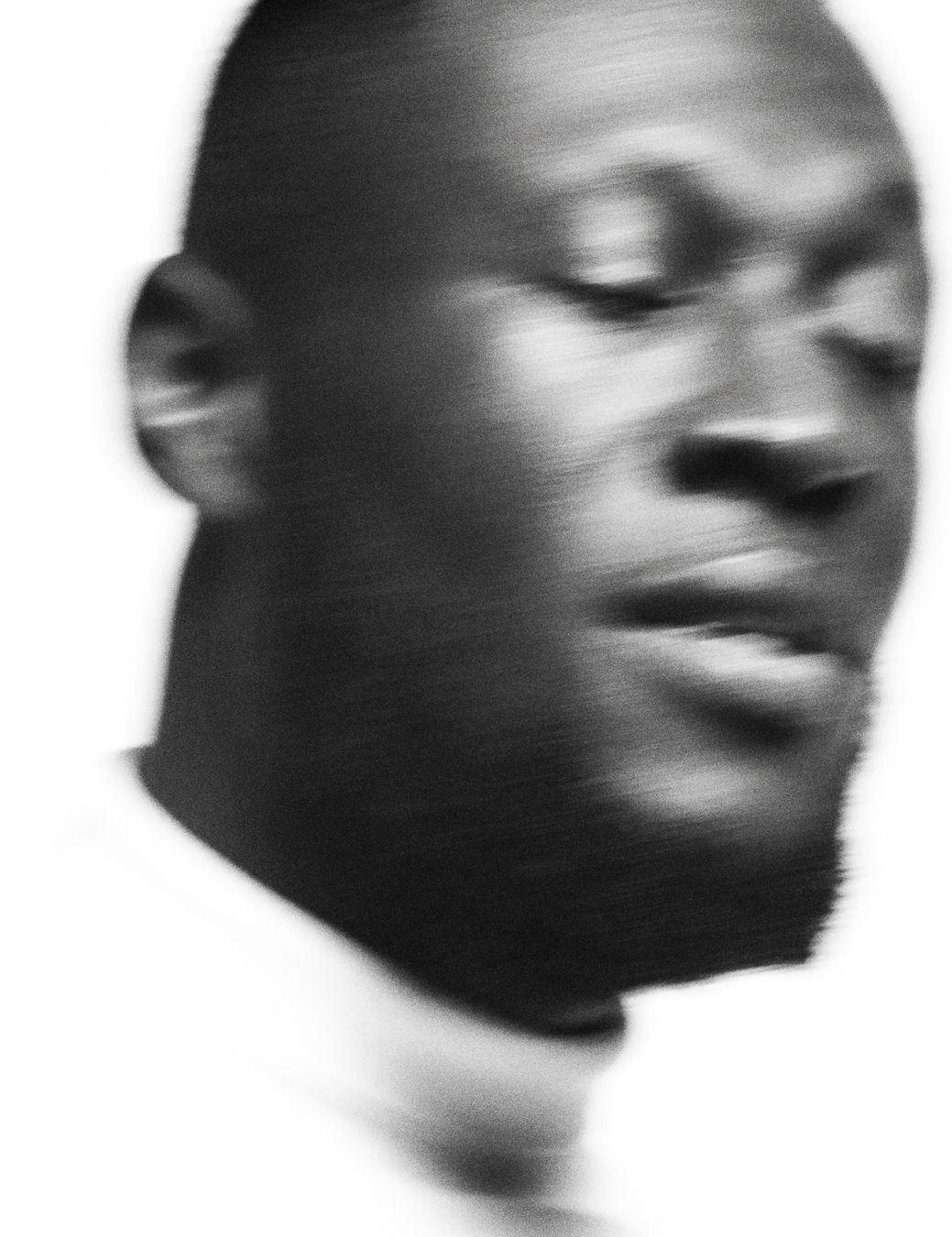
Stormzy: This song is one of the truest testaments to how we made the album. For a long time, it was the first song on the track list. Prgrshn, the executive producer of the album, and Jermaine, my cousin who is also my creative partner, everyone thought it was the intro. But this song is really melodic, soulful and vulnerable, and I never really knew if it was the intro. It’s a song about my ex-girlfriend and, at the time I made it, she was the most pressing matter in my heart. As soon as I went to touch the mic, this was what came out of me. It goes back to the thing of considering the audience last. Before, when I’d make an album, I’d think like a rapper: that first tune you have to rap and show everyone how good you are at rapping. And that comes from a place of ego rather than a place of art.
Rick: Sometimes you think about music like it is a competition.
Stormzy: Exactly. So, to an extent, this first song is about me killing my ego. It’s about letting my truth speak for itself.
Rick: Beautiful. Play the song, man.
Stormzy: Alright, here we go.
[“Fire + Water” plays. The song opens with an organ playing a melancholic chord sequence, Stormzy starts singing. It’s a song about love and god, almost a hymn. The first verse starts, Stormzy softly rapping about memories of a relationship, the regrets. The song slowly gathers momentum before exploding into wailing guitars and heavy drums. It ends with a long coda, a West African-inflected drum breakdown, with an echo of the original, melancholic organs finding a more uplifting, lighter mode]
Rick: Wow! You sound so free – it’s completely unexpected, really beautiful. It’s almost like three songs…
Stormzy: It actually started as two different songs that then grew into one: it happened not as some kind of artistic defiance to make this eight-minute long song, but just because it felt good. I was listening to both of the songs separately a lot on tour, and it just began to feel like they made sense together, that they were telling parts of the same story.
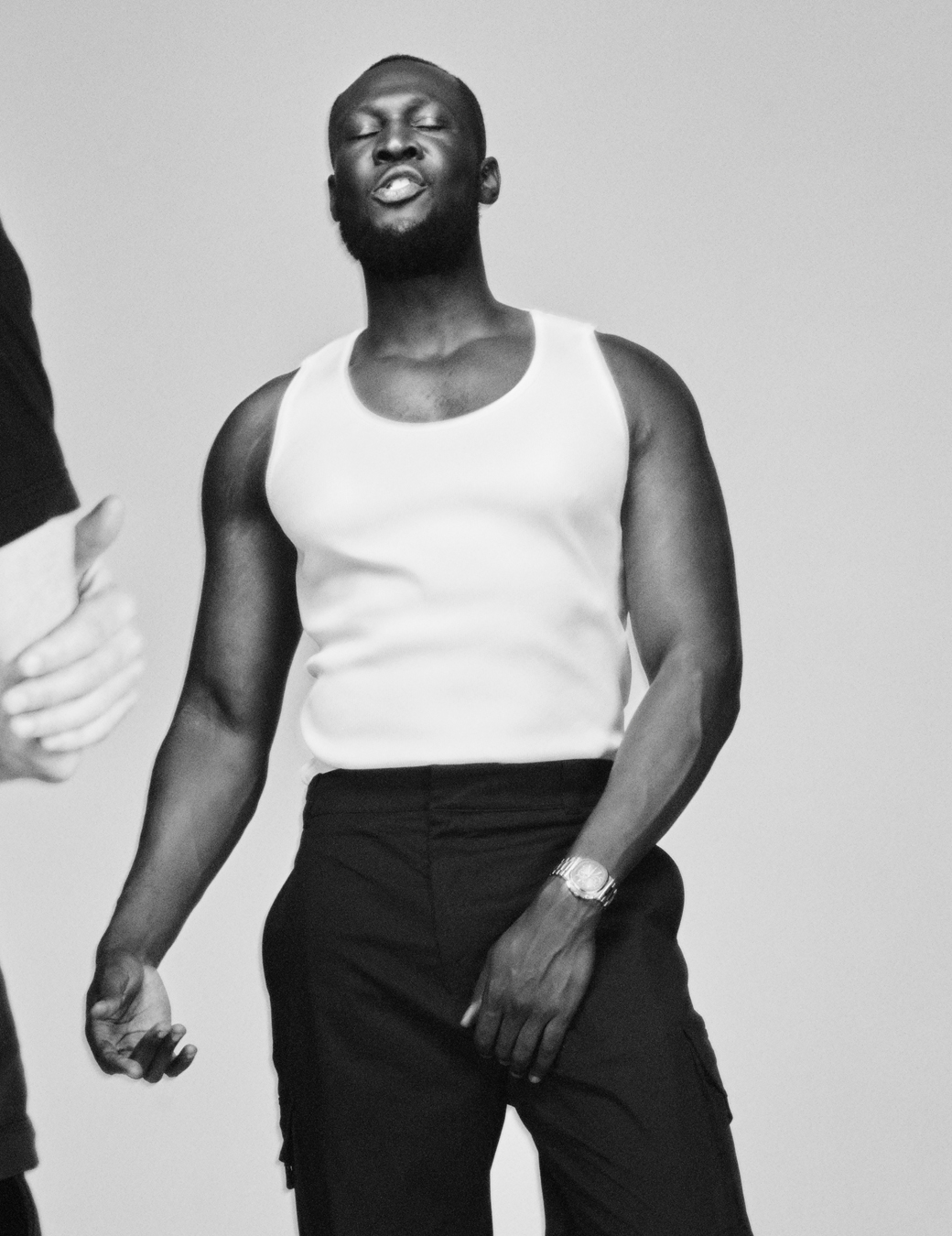
Rick: It really feels like a story. What was the first thing that happened in this song?
Stormzy: We recorded this on the first day that we went into the studio. Prgrshn played this chord sequence, and I just started free- styling over it. If you listen to the first demos we made, so much of the final song is there – it just came out. To be honest that’s my process a lot of the time: I grab the mic and see what comes out, what feels good. Over time we worked on it a lot but it was really the energy of the first session that we wanted to capture. God was in the room.
Rick: You have to never take that for granted but you come to realise that, if you live in the world enough, and work in a certain way, it happens. On the one hand it’s crazy, but on the other, it happens all the time.
Stormzy: The feeling never gets old.
Rick: It’s so exciting! Because you go into the studio and you never know what is going to happen. Of course, sometimes what happens is terrible. It can’t always be good. But when it is good, it’s unbelievable. The feeling is that it isn’t us, it’s something working through us.
Stormzy: Exactly!
Rick: I love the way there are no drums in the verses of this song because, when you listen to a piece of music without drums, without that beat, you listen to it in a different way. The beat absorbs the listener and you hear how the words relate to the beat; you notice the phrasing more. Without the beat you focus on the words.
Stormzy: Yeah, it’s like shining a spotlight on it.
Rick: Exactly. You hear it more and you understand it more. Then the beat comes in and the chorus is like a chant. And with the percussion section at the end, it feels like the story is continuing and developing. It’s unexpected because it would’ve been easy to do something very traditional, and end the song before that final section. But we’re lucky enough that it keeps going. I like how relaxed the delivery of the vocals are, how it doesn’t sound like a “performance”. It sounds like we’re hearing your inner thoughts. There’s nothing more profound and powerful than that. It’s like we’re close enough to hear what’s going on inside your head. It doesn’t feel like it’s you showing off about how good you rhyme.
Stormzy: It’s funny you say that, because this is something I had to do with this song in particular, because it’s a song about a real person and a real situation, so I really had to… Sometimes in rap there’s a way that I can say sorry for a mistake I have made, or I can say I love you, and I can be cool about it and make it really stylised. But for the reality of this situation, I had to kill the style. I had to really deliver it and write it in a way that made it sit beside the listener.
“It’s not about defying what everyone thinks about you; it’s about being totally true to yourself.” Stormzy
Rick: The lyrics feel like a diary entry – they’re so personal. I can’t wait for people to hear it.
Stormzy: I’m really excited.
Rick: Well let’s keep listening. What’s next on the album.
Stormzy: This is the next song, it’s called “This Is What I Mean”.
[The song opens with chanting before moving into stabbing choral notes. Stormzy starts rapping: “Time to make a statement / Time to free my mind of limitations / Finesse the majors, that’s my form of reparations / They said you can’t slide, you’re a treasure to the nation / But what they gonna do, what they gonna say? / Stormz got that sauce that’s that bolognese”. It’s cold, amorphous, slinky, boasting, vast. Growing bigger in detail and scope as the song progresses. It’s a song full of restless layers of vocals, chants, hooks, raps, underpinned and held together by those icy choral stabs]
Rick: Wow!
Stormzy: That song always feels like a lot. I love it! It’s like a sonic explosion, isn’t it?
Rick: Yeah, definitely. I love those backing vocals. It’s got this spiritual vibe to it, even though maybe it’s a dance song. How’d this song come together?
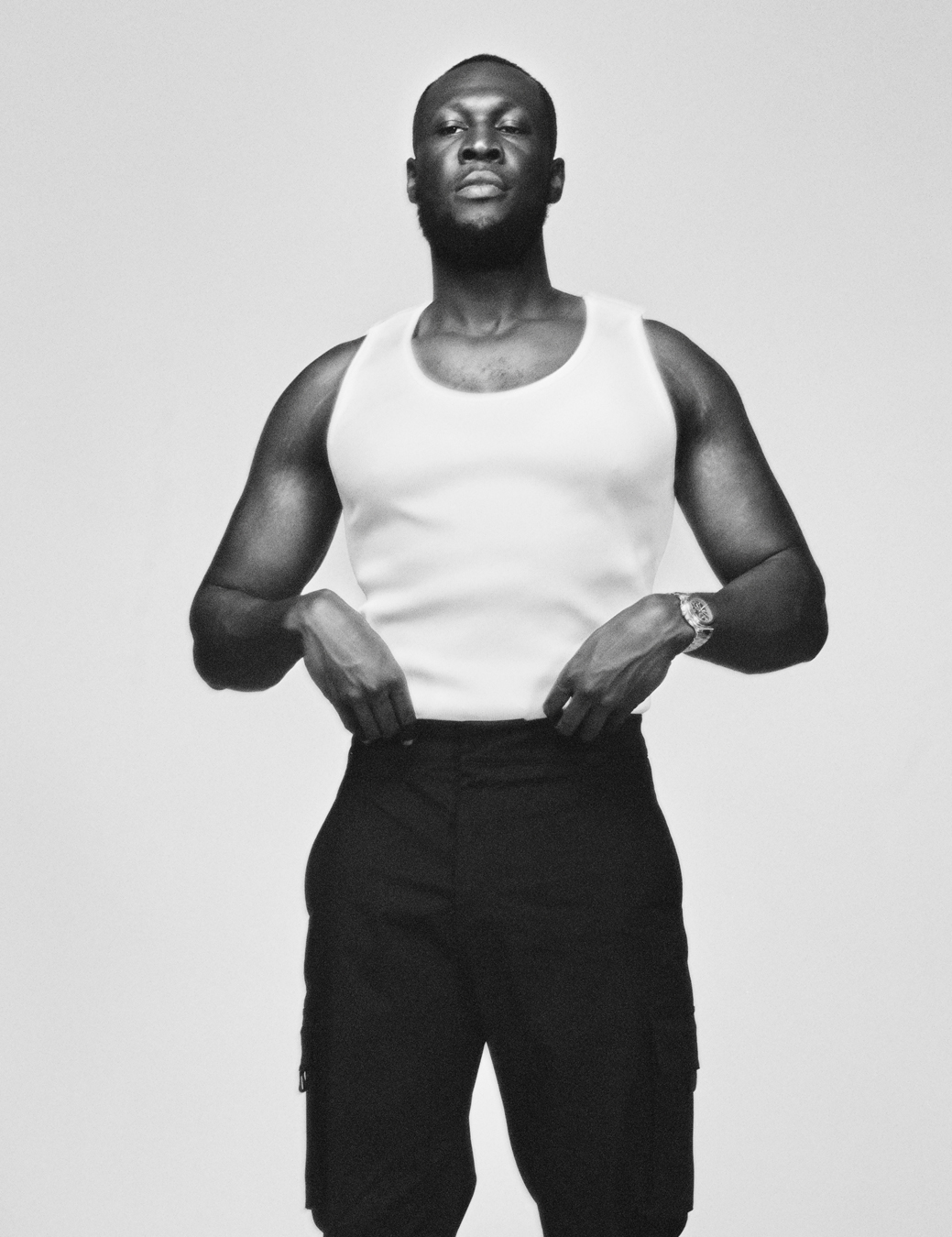
Stormzy: This song that happened in so many ways. It really started with this amazing producer called Knox Brown, and this chord progression by P2J. We had this idea for a song where I wanted to use all my favourite artists like how a painter might use different brushes and different colours. I didn’t want them to just do verses, I wanted to paint with their voices. So P2J sampled Jacob Collier’s voice, and turned that into something eerie, and we used that as the basis for this song and the sample – it just became more and more epic. It was one of those ideas, like that first song, that evolved over time. It’s about trying to do something that feels good and right, something that strikes a chord within my soul and my spirit. It’s like painting: if it feels right to put some red on the canvas we do; if we want to cover it in blue we do. This song is a testament to that process.
Rick: Before playing the next song, can you tell me about this tour you did recently. Where did you play?
Stormzy: The pandemic came along right when I was about to do a world tour. So we rescheduled it for this year, but I was only able to do Europe in the end. We ended up playing the last album, which came out in 2019. It was really special though. I’d not been on social media at all in that period, so it felt like I was with my people for the first time in a really long time. I would come out to play my music and every night I just felt incredibly thankful that people wanted to come out and listen to it. It reminded me that the art we do and this music that we make, it lives. I live a life — I mean not all the time, because sometimes I walk down the street and people recognise me — where I don’t usually feel the effect of my art. I spend a lot of time with my family and old friends… Then you come out on stage and people want to hear the music and it feels great. But also on this tour I felt really confident with singing, with doing the soulful songs, with playing the slower songs. I used to really push the high energy stuff, the grime stuff, and whenever I used to perform the slower and more melodic songs I’d be almost apologetic for it. But that’s not a brave way to be, because I’ve made all this other music, and I need to be proud and stand by it. So on this tour, we did a big chunk of the show with the band, just playing soulful and beautiful music to people. I’ve decided I’m not going to shy away from that anymore. I’m a grime artist, I’m a rapper, but I’m also an artist, I’m a musician. I want to do my R’n’B or my gospel, I need to stand on that and be proud of that.
Rick: Alright! That sounds amazing.
Stormzy: So yeah. Let’s play this next song. It’s called “Fire Babe”.
[The track opens with a violin. It’s a really beautiful, heartfelt love song. “I just can’t explain, even in the pain, you love me like a flame,” he sings]
Rick: It’s so beautiful. So vulnerable.
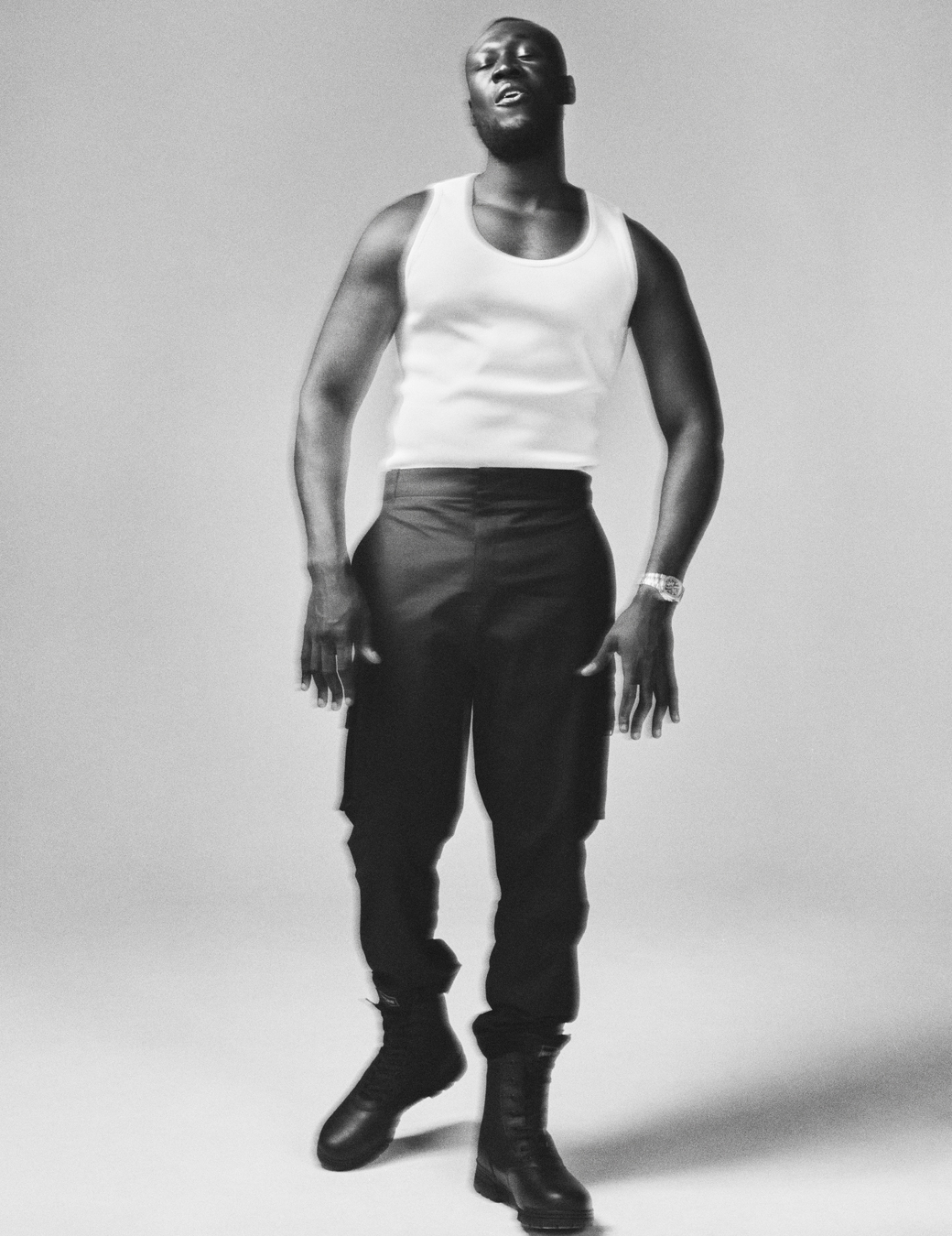
Stormzy: This song started with this amazing singer and songwriter called Debbie, who is really fantastic – she is maybe the most talented person I’ve come across recently. She’s unbelievable. We signed her to Def Jam as well. I got into the studio with her, and George Moore, a phenomenal producer, started playing these chords, and we started messing around with some melodies, and writing this story. It’s a song about that first spark when you meet your partner and how it feels. That first time, when you’re really observant of them. You might go to a party, or you’re having dinner, and you’re watching how they move, how they work the room. I’ve always sung and used melody but I’ve been sheepish about it. Five years ago I was brave to even dip my toe in but I needed to commit to it properly here. I want to sing how Stevie sings, or Frank Ocean, or Whitney. I mean I’ll never be able to sing like Whitney but I can sing my way. I can sing with my honesty and truth. That’s a place I’ve always wanted to be.
Rick: That’s what makes it believable. We know you mean it. That’s all that matters. How did you meet Debbie?
Stormzy: I met her through The Twins. Everything they recommend to me is very considered. And I got in the studio with Debbie and she is phenomenal. I couldn’t believe it.
Rick: Congratulations on signing to Def Jam by the way.
Stormzy: I know! How cool is that? It’s such a badge of honour.
Rick: Alright, let’s play the next one.
[A plaintive piano melody plays. A female voice sings, almost gospel, repeating: “Oh please”. Stormzy is half-rapping, mainly talking, narrating. The piano and backing vocals rise, offering hope. It’s a song about forgiveness and being forgiven, being vulnerable, the complexity of living in the public eye, being flawed as a person. It’s a song full of purpose, self-knowledge, realisation]
Rick: That might be my favourite one yet.
“You give me a beat and I can rap all day. But it’s not about that anymore. It’s about saying something with purpose and intent.” Stormzy
Stormzy: Thank you. That song is called “Please”. The word “please” is so multifaceted. There’s a vulnerability to it, a desperateness; there’s so many ways you can say please. I thought about what “please” means to me. It wasn’t something defiant. It was about letting everything roll out. I wanted to do something that wasn’t premeditated. It became a confession. It was very therapeutic.
Rick: The cycle of piano chords is so emotionally charged.
Stormzy: We all knew it was a special moment when we made it. We actually have a reprise of it on the album as well.
[Sampha starts singing “please” over the same chords. The song develops into a more hopeful version of the same song – still desperate and vulnerable, but also optimistic]
Stormzy: Weirdly every time I listened back to the song I’d made, in my head I just kept on hearing Sampha’s voice singing over it. He’s got so much feeling and truth in his voice. It’s back to this mantra: you have to do what feels right. What feels good. I just wanted to hear how he would sound singing this song. I asked and he came into the studio and just kept going.
Rick: You can feel the story in that though, how the song comes back and it’s in his voice now.
Stormzy: Yeah exactly, thank you. So this next song is called “Need You”.
[It starts with an afrobeats rhythm, Stormzy rapping, almost slurred, relaxed, charming. It’s a gentle, percussive track]
“I feel like this album unlocks whatever freedom I’ve been looking for – both as a man and as a creative. It allows me to spread my wings.” Stormzy
Rick: There’s confidence in how mellow this song is.
Stormzy: I like that if I heard that song, I’d think someone else had made it. Do you know what I mean? But it feels good.
Rick: It shows confidence. It’s the song you wish you could do because you like it, but it’s hard to make it fit exactly into what you do. But having it is like you saying: I’m free to be myself. These songs all really fit together really well. There’s a real consistency of sound to the whole album that’s carried in these different songs.
Stormzy: I think that consistency is because of the truth of the songs, the essence of them. When we were making this album, we didn’t go in to make songs in a specific style. Instead, we had an approach and an ethos to the album that carried into every piece of music. As much as it’s a broad sonic soundscape, we approached every song with a feeling of truth – so whether it was something really hard and rap, or something really soft, they live in the same space because they were made with the same intention. Let me play this one next.
[A church organ plays, a choir starts singing “Reach out, be there”. Stormzy comes in rapping. It’s a song about the end of a relationship, about trying and fighting to keep things together]
Stormzy: That song is called “Hide and Seek”. I’m really proud of it. I think it’s a song I’ve been trying to have the confidence to write my whole career. A song where I can rap and sing, and create something really warm. I love warmth, I love soul and melody. I would hear other people make songs like that and I’d be a bit jealous, because it felt like it was their bag. So to be able to do them myself, it’s a bit like coming full circle.
Rick: It feels like there’s a story that links all the songs?
Stormzy: It wasn’t premeditated. I went into the studio and it just came out. I think you’ve got to give God credit and give the heart credit. Sometimes the heart does what it wants.
Rick: Especially if we don’t get in the way.
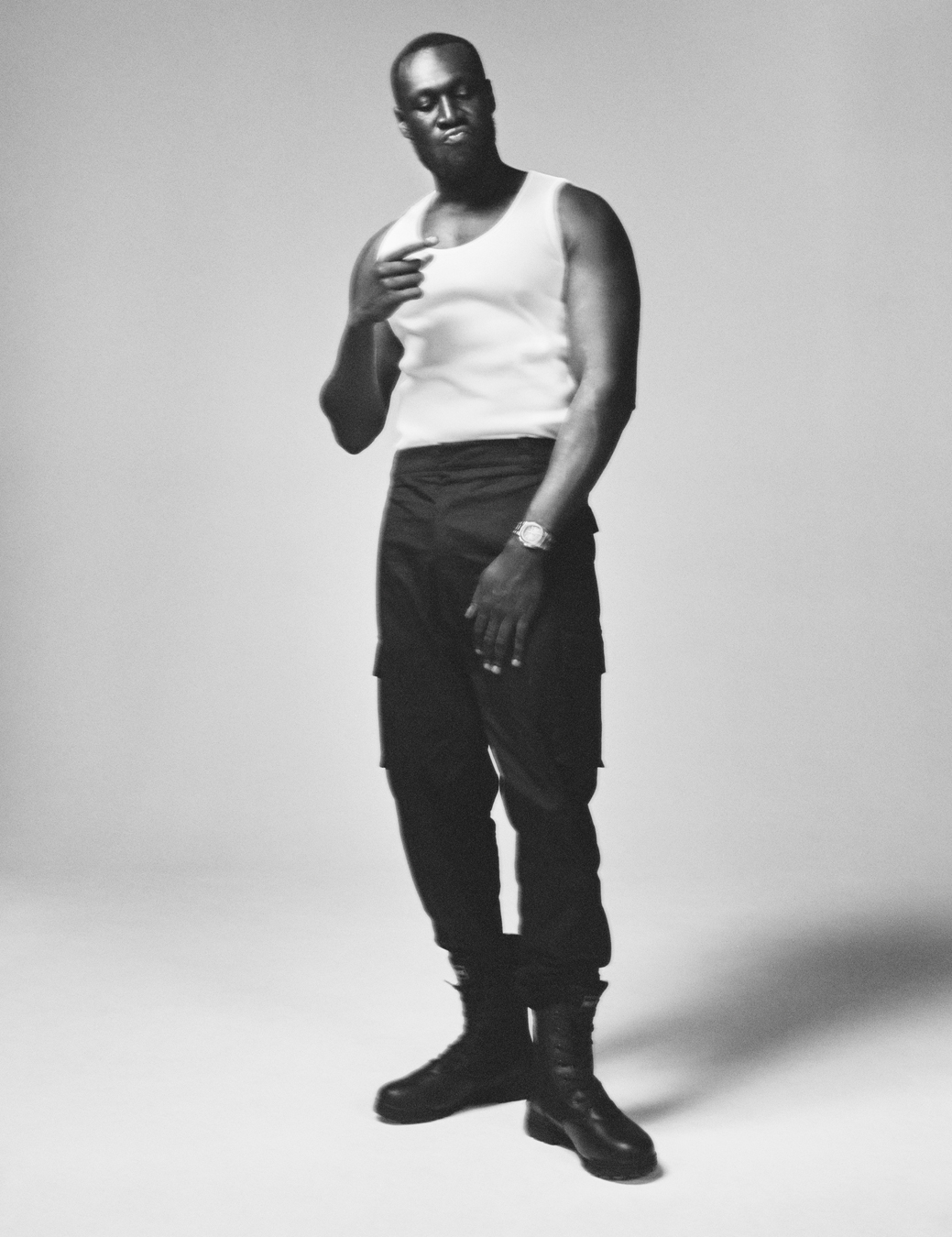
Stormzy: As artists, that’s the best place to be: letting your experiences and memories speak for themselves. People ask me about this album and the word I always come back to describing it with is feeling. I just want people to feel this album.
[”God in all my flows, heaven in my tracks / my kettles all gold, my presidents are Black,” Stormzy raps. It’s boasting, lilting, happy, although it’s a defiant song about Stormzy’s career, faith, music in general, school curriculums, being Black in Britain and the world. Including a Michael Gove diss, references to Raheem Sterling, Serena Williams and Zadie Smith. Choirs underpin the abstract jazz drum beat. The track ends with Jazzie B talking about the Black British experience and coming full circle]
Rick: It’s the first time I’ve ever heard Zadie Smith get name dropped in a song.
Stormzy: Shout out to Zadie. I love her. I really wanted to pay homage to her in some way.
Rick: What came first with that song?
Stormzy: The sample is from this amazing Swedish artist called Daniela Rathana. It blew me away. It’s so soulful. It hit me right in my spirit. So I played it for Prgrshn and he was blown away too. He sampled it and I knew I wanted to rap over it, but it took me some time to figure out what I wanted to say. I had to get into a specific place, because I’m also in a new place as a man, so when I go to rap now I start by trying to figure out what I want to say. It’s not just about rhyming and showing off and placating my own ego. It’s about what I want to say. You give me a beat and I can rap all day. But it’s not about that anymore. It’s about saying something purposeful and intentional. That song is called “My Presidents Are Black”. It’s a bit of a reference to Def Jam. Because that means so much to me. The person speaking at the end is Jazzie B of Soul II Soul. It’s a song about arrival, about being here, and standing for something. This next song is called “Holy Spirit”…
[A very soft piece of chamber piano music starts playing. A church organ comes in. No beat and no backing. Stormzy starts singing: “If you knew the pressure on my shoulders, Father help me hold this / because I can’t bear the pressure.” It’s a song about religion and faith. “At times when I felt worthless / you gave me peace and purpose / although I don’t deserve it / even though I’m far from perfect,” he sings]
Rick: If that last song was a confession, this one is a hymn.
Stormzy: This was a song that was about reconnecting with God. It’s a song about coming of age, becoming an adult, and coming to understand yourself. My collaborator Dion, we call him the chord lord because he has the Midas touch when it comes to keys. He’s on loads of tracks on the album actually. He just started playing and I just started singing. The melody was a one take. I worked out the lyrics later, but the melody just came to me. The Holy Spirit was in the room and I caught it. It felt so powerful.
Rick: I love it. I love how much piano there is on the album. It ties things together. It links the parts of the story together.
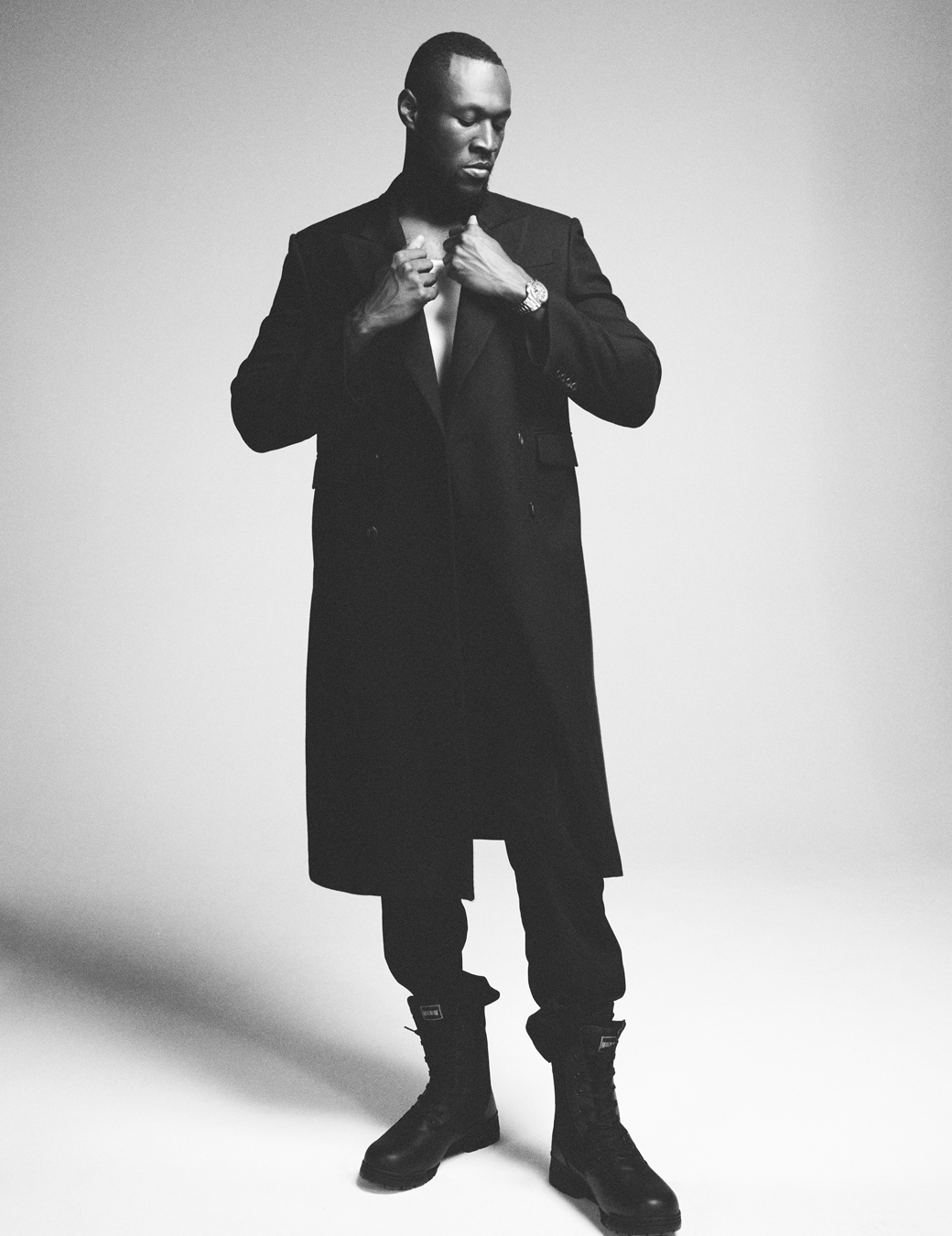
Stormzy: This next one is called “Bad Blood”.
[It’s a song about growing apart and the break up of a relationship. Cold and emotive vocal samples back Stormzy half-rapping, half-singing. It’s a sad song, but with an optimistic hook: “When you love that much it’s never love lost / it still cuts deep but it’s mad love / cos when you had it that good it’s never bad blood.” It almost sounds like a song Prince could’ve recorded at his most honest. It’s about a relationship in the eye of the media, how things could have been different, or maybe how they could be better in the future]
Rick: What an amazing song. The lyrics. The backing vocals. It’s a great song. They’re not just great raps; they’re great songs. You’re doing good man. I’m so happy for you.
Stormzy: Thank you, man. I appreciate it. Let’s listen to the next one.
[Another song about faith, but also about proving doubters wrong; about doubt itself, success, materialism: “I was at my lowest when I bought myself the Double R”. Amazing looped back-up vocals underscore it all. “I think I got my smile back, the last time I linked depression was a while back / Me and loneliness kick it from time to time, she knows the deal / I ain’t her’s and she ain’t mine.” It’s a song, really, about growth and about acceptance]
Rick: This is a really spiritual album. You can really feel it.
Stormzy: Thank you. It reflects the man I am and the man I’ve become. Where I’m at in my life. It’s a reflection of growth. It’s not an attempt at music so much, it’s more me trying to hold up a mirror to myself.
Rick: It sounds like that. It’s so true. So warm. It’s got a good feeling to it.
Stormzy: I was really trying to make something beautiful and warm, so thank you. Let me play you the outro. This is with Debbie. It’s called “Give It To The Water”. It’s actually the first song we made together.
Rick: And it’s definitely going to be the last song on the album?
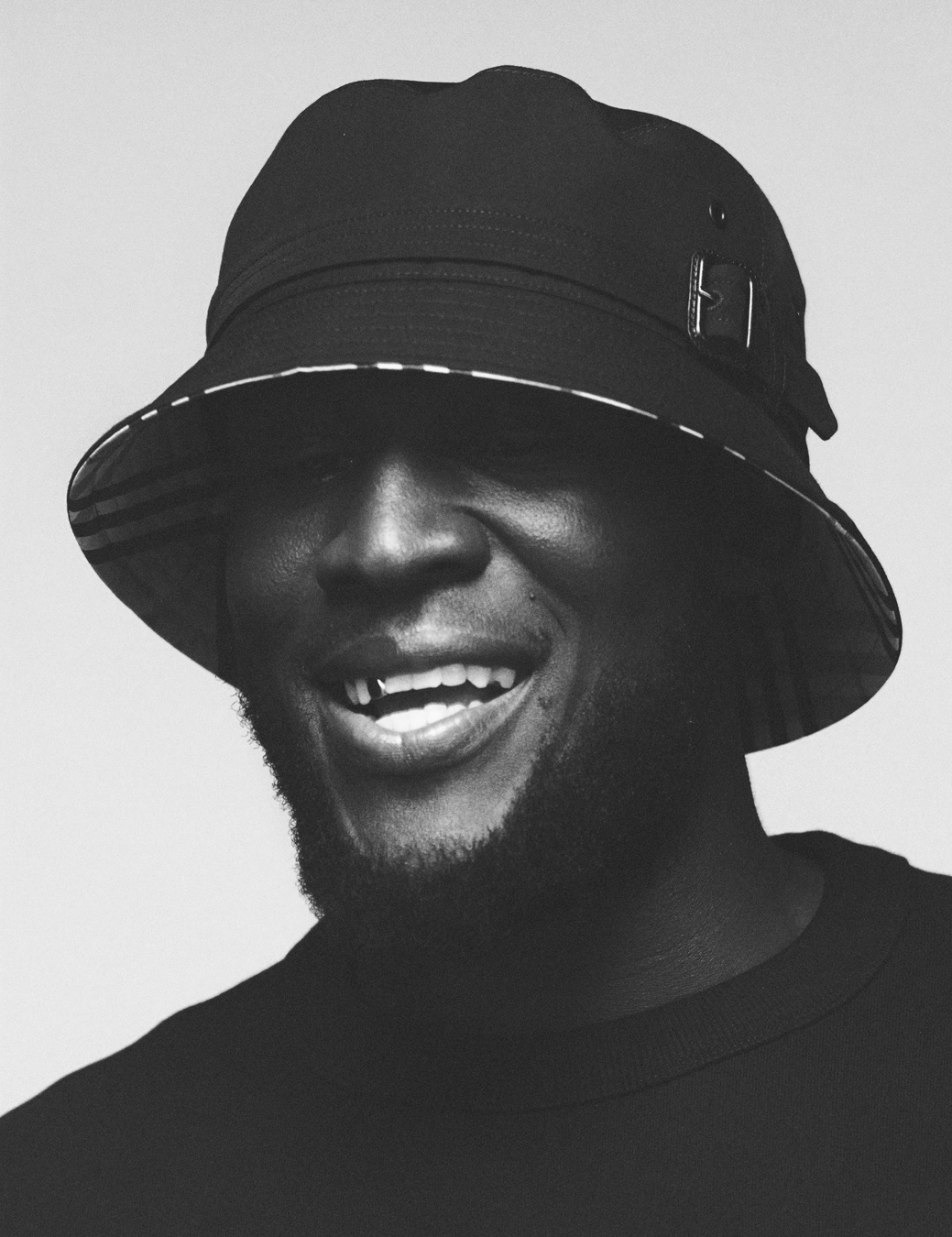
Stormzy: Yeah. I’ve wanted it to be the outro from the beginning.
[The track starts with a soulful piano. Debbie sings “Pressure, tension, I’m pushing but it’s getting harder / Lord knows I see it getting darker / I let go and give it to the water.” The choral backing vocals come in and harmonise on “Give it to the water”. Stormzy finally comes in to sing with Debbie: ”The water’s going to wash away the pain / I hear it when it’s calling out my name / It’s running and it’s flooding through my veins / Let it fill up the plains.”]
Stormzy: I knew from the beginning, from as soon as we made that track, that it would be the outro. If you think about the story the album is telling… During this chapter of my life, it felt like all I could do was give it to the water, give it to God. That’s all I could do. I’ve held myself accountable. I’ve looked in the mirror. I’ve deeped every detail of my life. And then I was just like, give it to God. Free yourself. It’s a fitting end to the album.
Rick: I can feel how powerful an album this is about that chapter of your life. I’m really excited because it’s so freeing. This is so unexpected that I don’t think anyone knows what to expect next. You’ve opened the door. You’re truly free and you can be free to make beautiful music. You can do it for a long time when what you’re doing is for you, and doesn’t need to please anyone else. Staying true to yourself is easier than trying to please other people. It’s impossible to please everyone.
Stormzy: I felt like that too. I feel like this album unlocks whatever freedom I’ve been looking for — both as a man and as a creative. It allows me to spread my wings.
Rick: I think people are going to really like it because it’s such a human sounding record.
Stormzy: I’ve made peace with the idea that no one may like it.
Rick: That’s the healthiest way, and the strongest way, to make art. Because all you can do is be true to yourself.
Stormzy: I love you. Thank you man. Playing this for you has been an honour and a dream.
Rick: Come and hug me man.
Stormzy: God bless you, Rick. Take care.
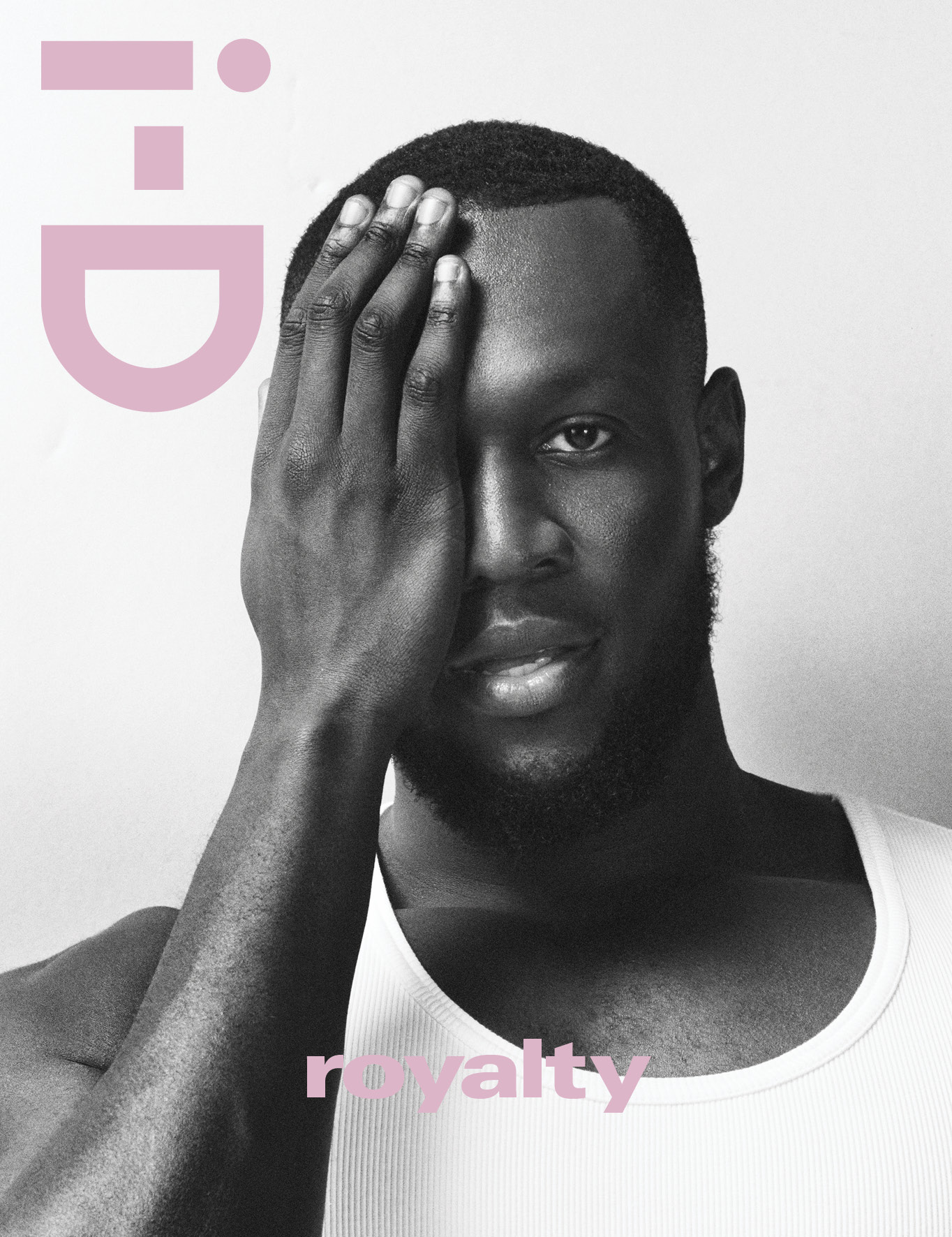
Credits
Introduction Felix Petty
Photography David Sims
Fashion Alastair McKimm
Grooming Bianca Simone Scott using Dior
Set design Poppy Bartlett at The Magnet Agency
Photography assistance Dale Cutts, Mark Lincoln and Federico Fossati
Digital technician Luca Trevisani
Fashion assistance Madison Matusich and Milton Dixon III
Tailor Michelle Warner
Set design assistance Miranda Latimer and Dominika Opálená
Set construction Cineco
Production Partner Films
Casting director Samuel Ellis Scheinman for DMCASTING



